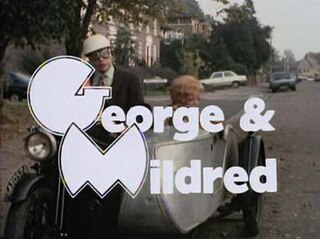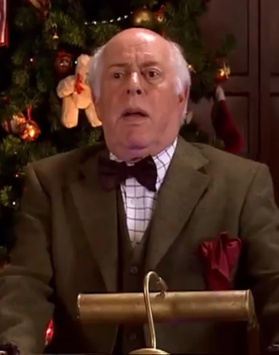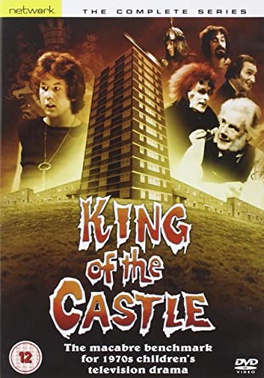
Jeeves and Wooster is a British comedy-drama television series adapted by Clive Exton from P. G. Wodehouse's "Jeeves" stories. It aired on the ITV network from 22 April 1990 to 20 June 1993, with the last series nominated for a British Academy Television Award for Best Drama Series. Set in the UK and the US in an unspecified period between the late 1920s and the 1930s, the series starred Hugh Laurie as Bertie Wooster, an affable young gentleman and member of the idle rich, and Stephen Fry as Jeeves, his highly intelligent and competent valet. Bertie and his friends, who are mainly members of the Drones Club, are extricated from all manner of societal misadventures by the indispensable Jeeves.

Martin John Christopher Freeman is an English actor. Among other accolades, he has won an Emmy Award, a BAFTA Award and a Screen Actors Guild Award, and has been nominated for a Golden Globe Award.

George and Mildred is a British sitcom produced by Thames Television and first aired between 1976 and 1979. It is a spin-off from Man About the House, and starred Brian Murphy and Yootha Joyce as constantly-sparring married couple George and Mildred Roper. The premise of the series had George and Mildred leaving their flat as depicted in Man About the House and moving to a modern, upmarket housing estate in Hampton Wick. Their arrival horrifies their snobbish neighbour Jeffrey Fourmile, a middle-class estate agent who fears the Ropers' presence will devalue his home.
Robert Alexander Spiers was a Scottish television comedy director and producer. He worked on many sitcoms and won two British Academy Television Awards for Fawlty Towers and Absolutely Fabulous. He also directed the film Spice World (1997).

Doomwatch is a British science fiction television programme produced by the BBC, which ran on BBC1 between 1970 and 1972. The series was set in the then present day, and dealt with a scientific government agency led by Doctor Spencer Quist, responsible for investigating and combating various environmental and technological dangers.
Troy Kennedy Martin was a Scottish-born film and television screenwriter. He created the long-running BBC TV police series Z-Cars (1962–1978), and the award-winning 1985 anti-nuclear drama Edge of Darkness. He also wrote the screenplay for the original version of The Italian Job (1969).

Clive Walter Swift was an English actor and songwriter. A classically trained actor, his stage work included performances with the Royal Shakespeare Company, but he was best known to television viewers for his role as Richard Bucket in the BBC sitcom Keeping Up Appearances. He played many other television and film roles.

Play for Today is a British television anthology drama series, produced by the BBC and transmitted on BBC1 from 1970 to 1984. During the run, more than three hundred programmes, featuring original television plays, and adaptations of stage plays and novels, were transmitted. The individual episodes were between fifty and a hundred minutes in duration. A handful of these plays, including Rumpole of the Bailey, subsequently became television series in their own right.

The Wednesday Play is an anthology series of British television plays which ran on BBC1 for six seasons from October 1964 to May 1970. The plays were usually original works written for television, although dramatic adaptations of fiction also featured. The series gained a reputation for presenting contemporary social dramas, and for bringing issues to the attention of a mass audience that would not otherwise have been discussed on screen.

The Grove Family was a British television series soap opera, generally regarded as the first of its kind broadcast in the UK, made and broadcast by the BBC Television Service from 1954 to 1957. The series concerned the life of the family of the title, who were named after the BBC's Lime Grove Studios where the programme was made.

Star Cops is a British science fiction television drama series first broadcast on BBC2 in 1987. It was devised by Chris Boucher, a writer who had previously worked on the science fiction television series Doctor Who and Blake's 7 as well as crime dramas such as Juliet Bravo and Bergerac. Set in the year 2027, a time where Interplanetary travel has become commonplace, it starred David Calder as Nathan Spring, commander of the International Space Police Force—nicknamed the "Star Cops"—who provide law enforcement for the newly developing colonies of the Solar System. The series follows Nathan Spring and the rest of his multinational team as they work to establish the Star Cops and solve whatever crimes come their way. Operating in a relatively accurately realised hard SF, near-future, space environment, many of the cases that the Star Cops investigate arise from opportunities for new crimes presented by the technologically advanced future society the series depicts and from the hostile frontier nature of the environment that the Star Cops live in.

The Rag Trade is a British television sitcom broadcast by the BBC between 1961 and 1963 and by LWT between 1977 and 1978. Although a comedy, it shed light on gender, politics and the "class war" on the factory floor.

King of the Castle is a British children's television fantasy drama serial made by HTV for ITV in 1977.

Murder Rooms: Mysteries of the Real Sherlock Holmes is a television crime drama series created by David Pirie, and co-produced by the BBC and WGBH Boston, a PBS station. Six episodes were made and were first broadcast on BBC Two, the first two on 4 and 5 January 2000, and the other four from 4 September to 2 October 2001.
Philip Jackson is an English actor known for his many television and film roles, most notably as Chief Inspector Japp in both the television series Agatha Christie's Poirot and in BBC Radio dramatisations of Poirot stories; as Melvin "Dylan" Bottomley in Porridge; and as Abbot Hugo, one of the recurring adversaries in the cult 1980s series Robin of Sherwood.
David Pirie is a screenwriter, film producer, film critic, and novelist. As a screenwriter, he is known for his noirish original thrillers, classic adaptations and period gothic pieces. In 1998, he was nominated for a BAFTA for Best Drama Serial for his adaptation of Wilkie Collins's 1859 novel The Woman in White into "The Woman in White". His first book, A Heritage of Horror: The English Gothic Cinema 1946–1972 (1973), was the first book-length survey of the British horror film. He has written several novels, including the Dark Beginnings of Sherlock Holmes trilogy which includes The Patient's Eyes (2002), The Night Calls (2003), and The Dark Water (2006).
Duggie Brown was an English comedian and actor. He was the younger brother of actress and singer Lynne Perrie.

Out of This World is a British science fiction anthology television series made by the ITV franchise ABC Weekend TV for ITV. It was broadcast on ITV in 1962. A spin-off from the Armchair Theatre anthology series, each episode was introduced by the actor Boris Karloff. Many of the episodes were adaptations of stories by science fiction writers including Isaac Asimov, Philip K. Dick and Clifford D. Simak. The series is described by the British Film Institute as a precursor to the BBC science fiction anthology series Out of the Unknown, which was created and produced by Out of This World creator Irene Shubik after she left ABC.

A Ghost Story for Christmas is a strand of annual British short television films originally broadcast on BBC One between 1971 and 1978, and revived sporadically by the BBC since 2005. With one exception, the original instalments were directed by Lawrence Gordon Clark and the films were all shot on 16 mm colour film. The remit behind the series was to provide a television adaptation of a classic ghost story, in line with the oral tradition of telling supernatural tales at Christmas.

The Water Margin is a Japanese television series based on the 14th-century book Water Margin, one of the Four Great Classical Novels of Chinese literature. Made in two seasons of 13 episodes each by Nippon Television it was shown in Japan in 1973 and 1974 as 水滸伝.















